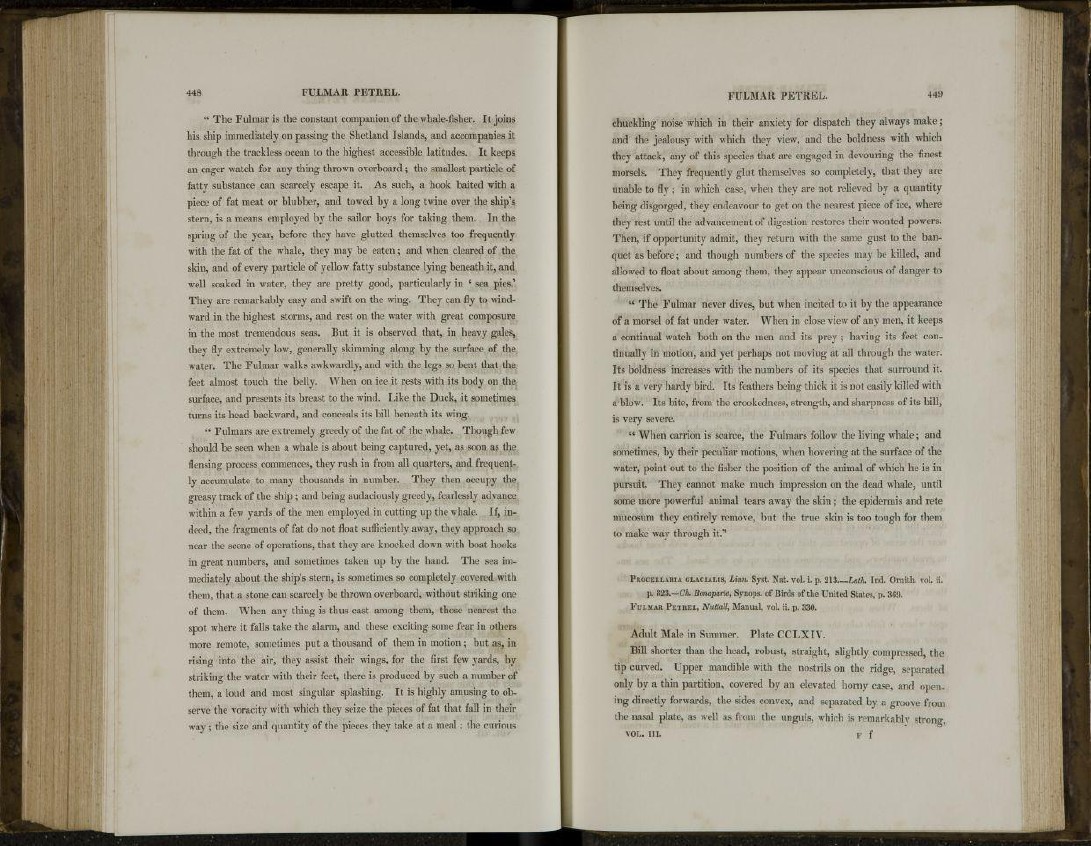
448 FULMAR PETREL.
" The Fulmar is the constant companion of the whale-fisher. It joins
his ship immediately on passing the Shetland Islands, and accompanies it
through the trackless ocean to the highest accessible latitudes. It keeps
an eager watch for any thing thrown overboard; the smallest particle of
fatty substance can scarcely escape it. As such, a hook baited with a
piece of fat meat or blubber, and towed by a long twine over the ship's
stern, is a means employed by the sailor boys for taking them. In the
spring of the year, before they have glutted themselves too frequently
with the fat of the whale, they may be eaten; and when cleared of the
skin, and of every particle of yellow fatty substance lying beneath it, and
well soaked in water, they are pretty good, particularly in 4 sea pies.'
They are remarkably easy and swift on the wing. They can fly to windward
in the highest storms, and rest on the water with great composure
in the most tremendous seas. But it is observed that, in heavy gales,
they fly extremely low, generally skimming along by the surface of the
water. The Fulmar walks awkwardly, and with the legs so bent that the
feet almost touch the belly. When on ice it rests with its body on the
surface, and presents its breast to the wind. Like the Duck, it sometimes
turns its head backward, and conceals its bill beneath its wing.
" Fulmars are extremely greedy of the fat of the whale. Though few
should be seen when a whale is about being captured, yet, as soon as the
flensing process commences, they rush in from all quarters, and frequently
accumulate to many thousands in number. They then occupy the
greasy track of the ship ; and being audaciously greedy, fearlessly advance
within a few yards of the men employed in cutting up the whale. If, indeed,
the fragments of fat do not float sufficiently away, they approach so
near the scene of operations, that they are knocked down with boat hooks
in great numbers, and sometimes taken up by the hand. The sea immediately
about the ship's stern, is sometimes so completely covered with
them, that a stone can scarcely be thrown overboard, without striking one
of them. When any thing is thus cast among them, those nearest the
spot where it falls take the alarm, and these exciting some fear in others
more remote, sometimes put a thousand of them in motion ; but as, in
rising into the air, they assist their wings, for the first few yards, by
striking the water with their feet, there is produced by such a number of
them, a loud and most singular splashing. It is highly amusing to observe
the voracity with which they seize the pieces of fat that fall in their
way ; the size and quantity of the pieces they take at a meal; the curious
FULMAR PETREL. 449
chuckling noise which in their anxiety for dispatch they always make;
and the jealousy with which they view, and the boldness with which
they attack, any of this species that are engaged in devouring the finest
morsels. They frequently glut themselves so completely, that they are
unable to fly ; in which case, when they are not relieved by a quantity
being disgorged, they endeavour to get on the nearest piece of ice, where
they rest until the advancement of digestion restores their wonted powers.
Then, if opportunity admit, they return with the same gust to the banquet
as before; and though numbers of the species may be killed, and
allowed to float about among them, they appear unconscious of danger to
themselves.
" The Fulmar never dives, but when incited to it by the appearance
of a morsel of fat under water. When in close view of any men, it keeps
a continual watch both on the men and its prey ; having its feet continually
in motion, and yet perhaps not moving at all through the water.
Its boldness increases with the numbers of its species that surround it.
It is a very hardy bird. Its feathers being thick it is not easily killed with
a blow. Its bite, from the crookedness, strength, and sharpness of its bill,
is very severe.
" When carrion is scarce, the Fulmars follow the living whale; and
sometimes, by their peculiar motions, when hovering at the surface of the
water, point out to the fisher the position of the animal of which he is in
pursuit. They cannot make much impression on the dead whale, until
some more powerful animal tears away the skin; the epidermis and rete
mucosum they entirely remove, but the true skin is too tough for them
to make way through it.1'
FROCELLAIIIA GLACIALIS, Linn. Syst. Nat. vol. i. p. 213.—Lath. Ind. Ornith. vol. ii.
p. 823.—Ch. Bonaparte, Synops. of Birds of the United States, p. 369.
FULMAR PETREL, Nuttall, Manual, vol. ii. p. 330.
Adult Male in Summer. Plate CCLXIV.
Bill shorter than the head, robust, straight, slightly compressed, the
tip curved. Upper mandible with the nostrils on the ridge, separated
only by a thin partition, covered by an elevated horny case, and opening
directly forwards, the sides convex, and separated by a groove from
the nasal plate, as well as from the unguis, which is remarkably strong,
VOL. III. i f